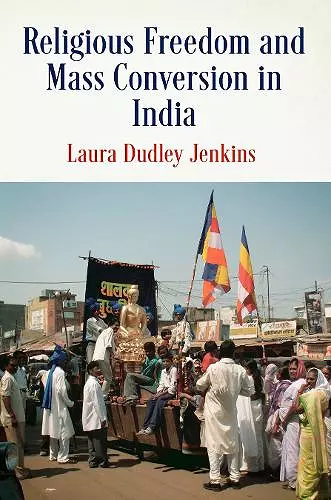Religious Freedom and Mass Conversion in India
Format:Hardback
Publisher:University of Pennsylvania Press
Published:31st May '19
Currently unavailable, and unfortunately no date known when it will be back

Religious Freedom and Mass Conversion in India argues that, although the right to religious freedom is enshrined in India's constitution, mass conversions to minority religions have complicated the practice of this right, which is increasingly invoked to restrict, rather than defend, the freedoms of minorities and women.
Hinduism is the largest religion in India, encompassing roughly 80 percent of the population, while 14 percent of the population practices Islam and the remaining 6 percent adheres to other religions. The right to "freely profess, practice, and propagate religion" in India's constitution is one of the most comprehensive articulations of the right to religious freedom. Yet from the late colonial era to the present, mass conversions to minority religions have inflamed majority-minority relations in India and complicated the exercise of this right.
In Religious Freedom and Mass Conversion in India, Laura Dudley Jenkins examines three mass conversion movements in India: among Christians in the 1930s, Dalit Buddhists in the 1950s, and Mizo Jews in the 2000s. Critics of these movements claimed mass converts were victims of overzealous proselytizers promising material benefits, but defenders insisted the converts were individuals choosing to convert for spiritual reasons. Jenkins traces the origins of these opposing arguments to the 1930s and 1940s, when emerging human rights frameworks and early social scientific studies of religion posited an ideal convert: an individual making a purely spiritual choice. However, she observes that India's mass conversions did not adhere to this model and therefore sparked scrutiny of mass converts' individual agency and spiritual sincerity.
Jenkins demonstrates that the preoccupation with converts' agency and sincerity has resulted in significant challenges to religious freedom. One is the proliferation of legislation limiting induced conversions. Another is the restriction of affirmative action rights of low caste people who choose to practice Islam or Christianity. Last, incendiary rumors are intentionally spread of women being converted to Islam via seduction. Religious Freedom and Mass Conversion in India illuminates the ways in which these tactics immobilize potential converts, reinforce damaging assumptions about women, lower castes, and religious minorities, and continue to restrict religious freedom in India today.
"The book is analytically insightful and methodologically innovative and provides a vital contribution to understanding the relationship between religion, the state, and citizenship rights in India." * Asian Ethnology *
"The primary argument of Religious Freedom and Mass Conversion in India is absolutely clear: The prototypical and normative convert constructed in international human rights discourse from the 1930s onward-one characterized primarily by agency and sincerity-is inadequate both theoretically and politically . . . Jenkins approaches the topic innovatively, intentionally juxtaposing to the normative narrative of the ideal agential and sincere convert counternarratives that call this normative narrative into question." * Journal of Church and State *
"Religious Freedom and Mass Conversion in India is unparalleled in its reach. It explores mass conversion over time-from the late colonial period to the modern era; across communities-among the lower castes, Hindus, Buddhists, Jews, and women; and in several different regions of India. It is a much needed contribution to scholarship on India and to comparative studies of religion, politics, and constitutional law." * Amrita Basu, Amherst College *
- Winner of Winner of the 2020 Hubert Morken Best Book, granted by the Religion and Politics Section of the American Political Science Association 2021
ISBN: 9780812250923
Dimensions: unknown
Weight: unknown
320 pages